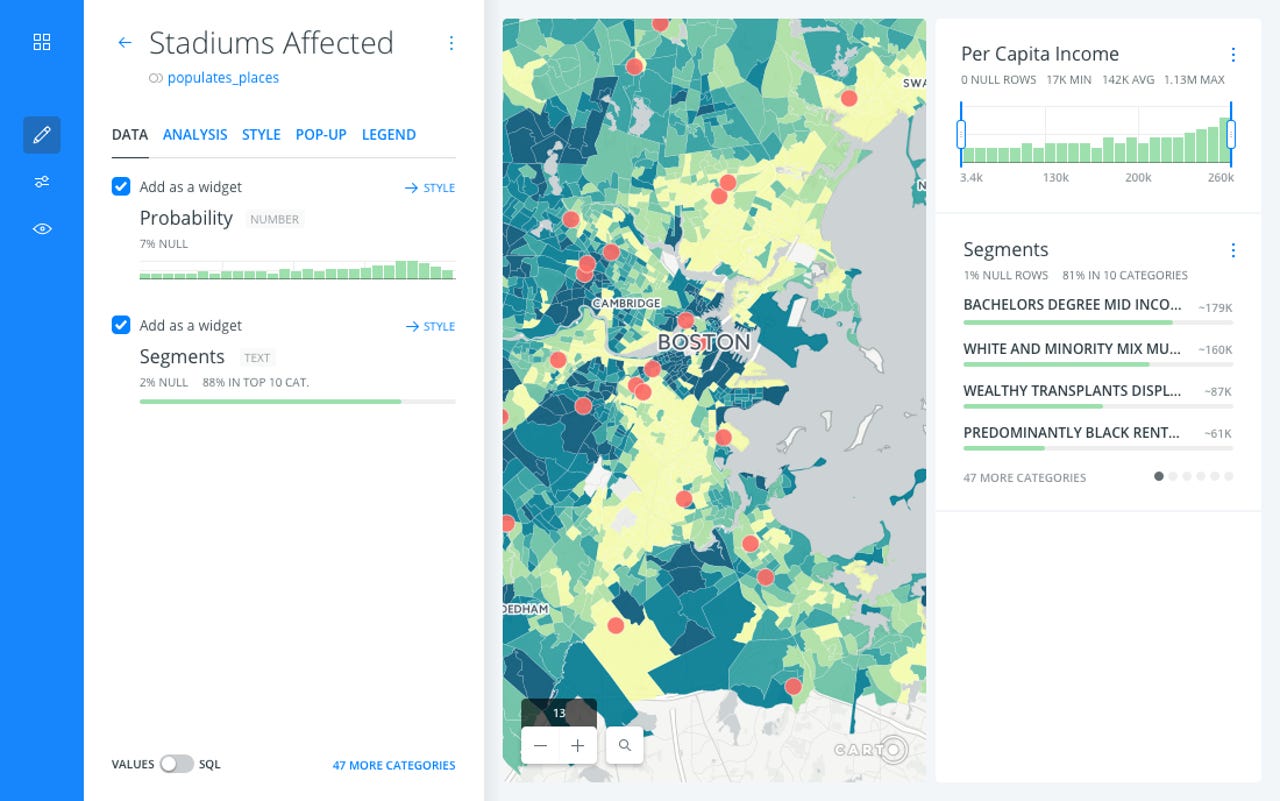Carto's Builder: New beta helps non-coders create mapping apps


Carto says the new Builder tool helps firms extract more value from data without needing coding skills to write their own apps.
Spanish startup Carto, formerly CartoDB, has unveiled a new web-based tool that lets businesses turn a range of location data into map and visualization apps without specialist geospatial coding expertise.
The new Carto Builder self-service product, now available in beta, offers firms analysis features and lets them create dashboards from a drag-and-drop interface.
As well as the widget-driven dashboards, there's an array of maps and unified workflows, plus an SaaS deployment model to push out new features to a wider audience when necessary.
Describing Builder as adding business-intelligence capabilities to widget-based applications, the company says Builder introduces a new visual language that does not require coding skills to build advanced geospatial apps for better decision making.
"With our new product, a user can take on one of two roles: the builder and the viewer. With Builder, a web-based drag-and-drop analysis tool, we're targeting business analysts who may already know how to work with data, but may not be able to code," Carto CEO Javier de la Torre said.
"In using it, they'll now be able to create apps to fulfill their use cases. Then these apps, created by the business analyst, can be consumed by any other business user as the viewer."
According to Carto, based in New York and Madrid, with additional locations in San Francisco and Estonia, the company's SaaS product, CartoDB, allowed users to create interactive maps and display geo-referenced information.
However, if they wanted to extract more value from the data to find out, for example, where the customers of a certain retail shop are located and predict other places where similar clients could be found, or analyze the impact of subway disruptions, or the spread of the Zika virus, users had to know how to write SQL or CSS code.
In creating their apps using Builder, businesses can use their own enterprise data about, say, clients, suppliers, and retail shops. But they can also import public data, such as census and demographic information, and other third-party data about traffic, social events or mobility.
Data is aggregated and anonymized, so it's not controversial and can be used to better understand the context around a particular location, the company assures.
Carto, which has cut the DB part of its original brand to show it's no longer just for developers, has a team of 100 employees and a portfolio of 1,400 customers including the Spanish bank BBVA, The Boston Consulting Group, the city of New York, Twitter, and Vodafone.
However, de la Torre said businesses of any size will be able to use the new Carto Builder because location intelligence is key for remaining competitive.
"In the future, non data-driven organizations won't exist. [That's why] Carto wants to democratize the techniques that were previously only available to advanced organizations like Google, Uber or Facebook", he said.
Marc Torrent, director at innovation hub Big Data CoE Barcelona, said geographic information system techniques are not new but making the process simpler should help bring the benefits of location analytics into more organizations.
"Location intelligence is part of a mega trend around data-driven processes. This data is enabling automation software, and this is changing not only the internet, but the entire world. Every process that can be automated and replaced by software will be, and they will all need data to operate," Torrent said.
Carto CEO de la Torre said location is going to be a fundamental part of the information needed to power that automation.
"So, as part of a bigger trend, location intelligence, through machine learning, will enable not only self-driving cars, but many other things in our daily lives that will change society in a profound way", he said.
Read more on analytics
- SAP modernises analytics capabilities with Cloud for Analytics rebrand
- Cornerstone OnDemand launches suite of 'people analytics' tools
- Nokia launches mobile network analytics platforml
- Cisco wants to monitor everything in your data center, launches Tetration Analytics
- IBM's Watson Health, American Diabetes Association partner on cognitive apps, analytics